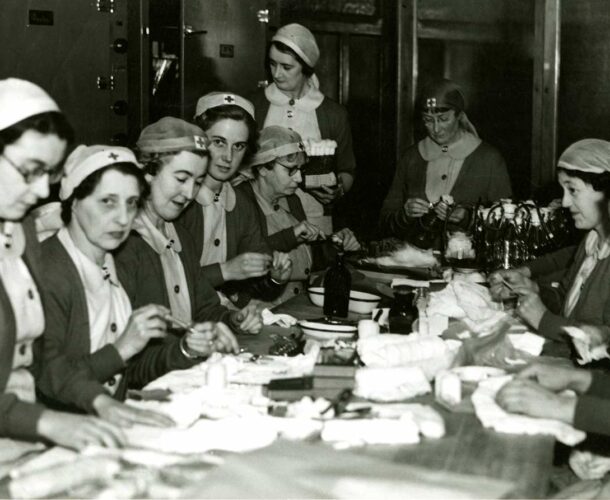“During the war the institute’s policy is to assist the Defence Department in every possible way.”1
Institute staff and space are increasingly given over to aiding the war effort. Research priorities focus on those infectious diseases most likely to affect service personnel, including influenza, scrub typhus, Q. fever and malaria.
Wartime activities include:
- Development of new techniques to supply blood and serum on the battlefield. These transfusion panniers are used by the Australian Army throughout the war.
- Housing and staffing of the Red Cross Blood Transfusion Service.
- Operation of the blood bank, supplying blood for emergency transfusions and for research to improve blood storage and handling.
- Blood grouping nearly a quarter of a million service personnel and civilian donors.
- Inoculation of doctors and nurses heading overseas.
- Training Red Cross aides in all aspects of obtaining and storing blood and blood products.
- Preparation of attenuated influenza virus for use in the event of a large scale influenza epidemic.
- Research into developing an influenza vaccine, involving an immunisation program undertaken in collaboration with the Army.
- Preparation of bacteriophages for the laboratory diagnosis of dysentery.
- Research into treating shock and haemorrhage.
- Development of methods to prepare pyrogen-free (clean) water.
- Training of medical officers in clinical pathology and biochemistry.
- At the request of the Army, research into gas gangrene infection.
Charles Kellaway, connecting the military with medical research
Institute director Dr Charles Kellaway, a World War I veteran and by now a well-known public figure, is appointed director of pathology at Army Headquarters, Melbourne.
He also acts as adviser to the Chemical Defence Board and the Army Inventions Directorate, and chairs the NHMRC’s Armoured Fighting Vehicles Committee studying the physiological requirements for tank crews. Kellaway later becomes scientific liaison officer to the Australian Army Medical Corps, with the rank of colonel.
At the request of the Scientific Advisory Committee of Great Britain, Kellaway travels the US, Canada and UK to study the latest developments in war medicine and to facilitate greater collaboration with Australian medical research.
1 Walter and Eliza Hall Institute 1939-40, Annual Report, Spectator Publishing Co., Melbourne




